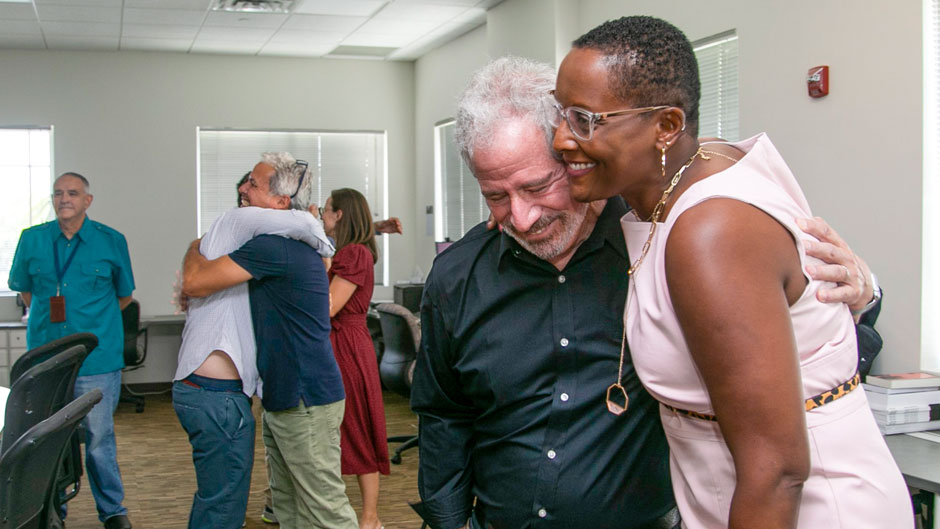When University of Miami School of Communication lecturer Heidi Carr and associate professor Sam Terilli learned that the Miami Herald won its 23rd Pulitzer Prize on Monday, both were thrilled.
Even though they are no longer working in the Herald newsroom, both spent much of their careers there alongside many of the reporters and editors responsible for the winning coverage. And, they still consider the staff an extended family.
For their coverage of the collapse of the Champlain Towers South condominium in Surfside last June, the Miami Herald received this year’s Pulitzer Prize in Breaking News Reporting, an honor given to the entire staff for “merging clear and compassionate writing with comprehensive news and accountability reporting,” the award states. The category has only been awarded to the newspaper once before, in 2001, for its coverage of the pre-dawn raid by federal agents on the home of relatives of Elian Gonzalez. Afterward, the boy was reunited with his Cuban father.
“I’m not surprised, but I am happy they were recognized,” said Terilli, who served as counsel for the paper from 1984 to 2000, worked on its editorial board for six years, and did a short stint as a reporter. “This was a horrible tragedy, but the Miami Herald has always been at its best when it rises to the occasion of covering a big story like this. They are especially good at telling late-breaking stories with sophistication and compassion.”
Former Herald writer Rene Rodriguez, who worked at the Herald for 33 years and is now manager of the University’s Bill Cosford Cinema, led a team of reporters who produced some of the first stories on the scene in Surfside.
“The Pulitzer is a great recognition of the incredible work the entire newsroom put into covering that horrible tragedy,” said Rodriguez, who was the paper’s film critic for 22 years. “It's a reminder of the critical importance of local newspapers and their coverage of their communities.”
Carr, Terilli, and Rodriguez are part of a network of University of Miami faculty members and former students with ties to the local newspaper. Like Rodriguez, many of them noted that the win shows the importance of local journalism at a time when newspaper readership has been declining.
“Other news organizations stayed here for a week or two, and left, but we have still been writing about Surfside for almost a year,” said Joan Chrissos, an adjunct lecturer, as well as the newspaper’s health and education editor. “We know what the issues are, and we investigate them because this is our community.”
However, like most local newspapers, the Herald is working with a much smaller news staff than in the past. Research from the University of North Carolina indicates that since 2004, more than 1,800 newspapers across the United States have closed as a result of declining print readership numbers, although another study from the Pew Research Center shows an increase in digital subscriptions since 2020.
“There’s so much going around today of people not really knowing what’s going on in their community, but just repeating what they heard from a post on social media or on a cable news channel,” said Carr, who spent 20 years working as an editor at the newspaper. “But if you really want to know what’s going on in your community, the local newspaper is your best bet, and the Herald is providing all of this information, so people should take advantage of it.”
As the winners were announced, Chrissos said she was unsure the newspaper would be able to overcome the competition. But a few minutes later, members of the team—who had gathered in the Doral office—erupted in cheers of jubilance, she said.
Chrissos led a team of reporters that initially wrote about the missing residents of the Champlain Towers South condominium. Soon, their efforts turned into a series of obituaries, which were published shortly after each of the 98 people who died were identified by Miami-Dade police. Simultaneously, another team focused on the building flaws and inspection reports, while yet another monitored the collapse scene for daily updates from police, fire rescue, and government leaders, Chrissos said.
“I’ve been at the Herald for 35 years, so I have been a part of other Pulitzer celebrations. But this one sticks with me because I was so involved in telling the stories,” she said, mentioning that another adjunct lecturer, Linda Robertson, wrote many of the features and obituaries for residents of the Champlain Towers South. “This is gratifying, but it’s bittersweet that we won an award because of a horrific tragedy,” she added.
Chrissos noted that her team made a point to include as much detail as they could about each resident, couple, or family, and to start with an anecdote about their life, rather than their death. It was not an easy task to digest. While working on a story, one reporter discovered that his former physical education teacher was one of the deceased. Chrissos said that she can still recall many of the names, photos, and posts she and her team sifted through during the coverage.
“I am proud of the work we did in telling the stories of these people, so their loved ones will have those to hold onto forever,” she added.
Chuck Rabin is the newspaper’s city and crime reporter and once served as the sports editor of The Miami Hurricane student newspaper, which he said was great training ground for his professional role. He started working for the Herald shortly before Hurricane Andrew, watched agents seize Elian Gonzalez in 2000, and spent time at the Surfside collapse. So, he has been part of several Pulitzer-winning projects.
“This is what the Herald is really good at,” he said. “We have a long history of jumping to action and swarming these big stories. It’s what we do well, and what we continue to do well, as tough as it is now.”

